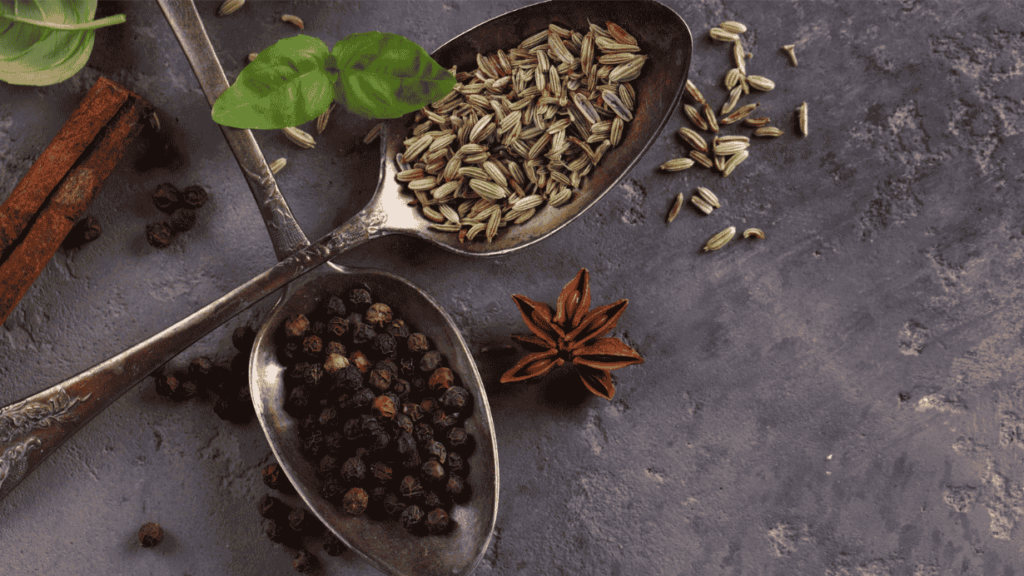Fresh Anis Seeds





Anis Seeds
Menu

| Heading | Information |
|---|---|
| Anis Seeds | Sweet, licorice-like flavor used in baking, liquors, and Middle Eastern recipes. |
| Producing Countries | Spain, Mexico |
| Producing Benefits | Digestive Health: Anise seeds are well-known for their ability to aid in digestion. They help relieve bloating, indigestion, and gas by promoting the secretion of digestive enzymes. Antibacterial and Antifungal Properties: Anise seeds contain compounds that have natural antibacterial and antifungal effects, helping the body fight infections and maintain a healthy immune system. Rich in Antioxidants: Anise seeds are rich in antioxidants, which help fight oxidative stress and protect cells from damage caused by free radicals. Hormonal Balance: Anise seeds are known for their mild estrogenic properties, which may help support hormonal balance in women, particularly during menopause or menstrual discomfort. Relieves Cough and Respiratory Issues: Anise seeds are often used to relieve symptoms of coughs and bronchitis. They can help clear mucus from the airways and ease respiratory discomfort. Anti-inflammatory Effects: The compounds in anise seeds have anti-inflammatory properties, which may help reduce inflammation in the body and alleviate conditions like arthritis. Improved Sleep: Anise seeds have a mild sedative effect and can be used as a natural remedy to promote better sleep and relieve anxiety. |
| Ingredients | Anise seeds come from the Pimpinella anisum plant, which is a member of the parsley family. The seeds are harvested from the flowers of the plant and are used whole or ground. Possible Additives: Anise seeds are typically sold as a whole or ground spice, without additives. However, pre-ground anise may sometimes contain anti-caking agents or preservatives, depending on the packaging. |
| Allergen | Potential Allergies: Anise seeds are generally considered safe for most people, but they may cause allergic reactions in some individuals, especially those who are allergic to plants in the carrot family (Apiaceae), such as fennel or caraway. Individuals with sensitivities to licorice may also have adverse reactions, as anise has a similar flavor profile. Cross-Contamination: Anise seeds may be processed in facilities that also handle other spices, nuts, or seeds, so there may be a risk of cross-contamination for those with nut or seed allergies. |
| Storage | Cool, Dry Place: Store anise seeds in a cool, dry place, away from heat and direct sunlight, to maintain their flavor and aroma. Airtight Container: To preserve freshness and prevent exposure to moisture or air, store anise seeds in an airtight container. Whole vs. Ground: Whole anise seeds retain their flavor and aroma longer than ground anise. Ground anise should be used within a few months for the best flavor. Refrigeration: Anise seeds don’t require refrigeration but can be stored in the fridge if you live in a hot, humid climate to prolong shelf life. |
| Nutrition Facts | Nutrition Facts (per 1 teaspoon or ~2.1 grams of anise seeds): Calories: Approximately 8 kcal Total Fat: 0.4 g Saturated Fat: 0.03 g Sodium: 0 mg Total Carbohydrates: 1.6 g Dietary Fiber: 0.8 g Sugars: 0.1 g Protein: 0.4 g Vitamins and Minerals: Vitamin C: 0.1 mg Vitamin A: 0.05 IU Calcium: 12 mg Iron: 0.4 mg Magnesium: 5 mg Potassium: 20 mg Manganese: 0.1 mg |


